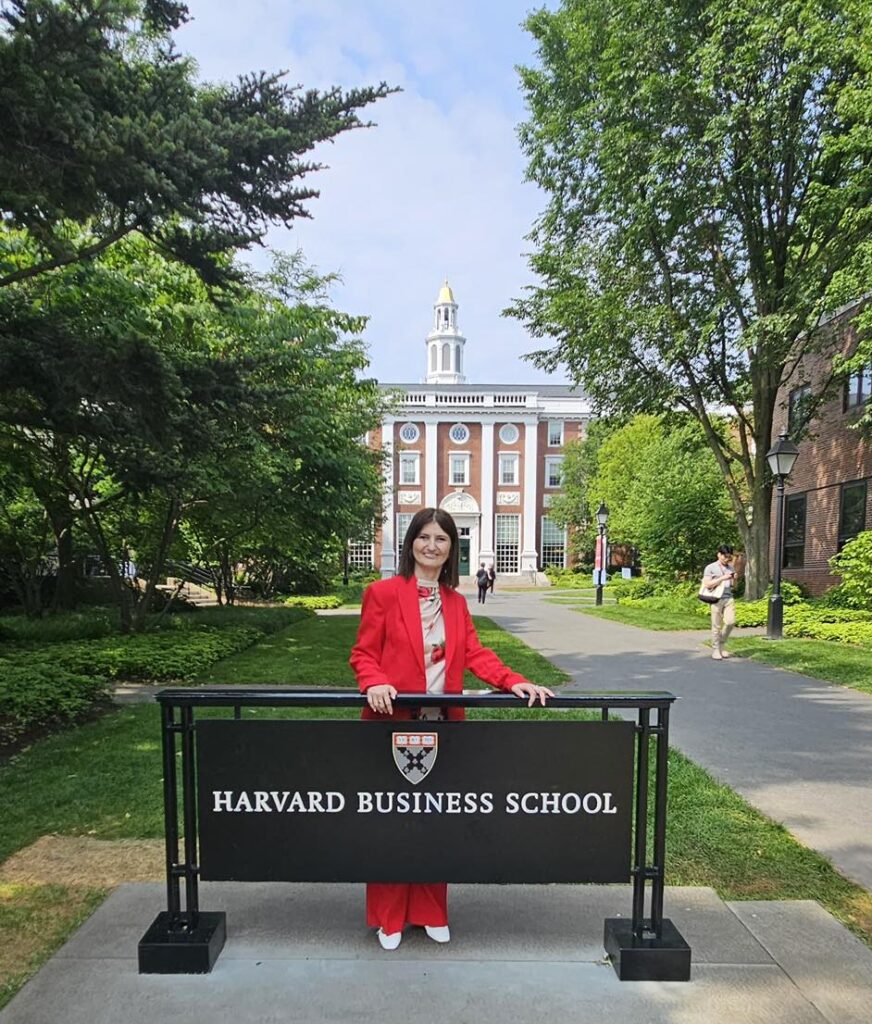In today’s fast-changing world, the ability to adapt, learn, and grow is more important than ever. As a woman with a disability, I know how vital it is to keep learning—not just for myself, but for the many women I work with. Each new experience gives me the tools to continue breaking barriers and to help other women with disabilities reach their full potential.
My journey as a leader started in 2006, when I participated in the Women’s Institute on Leadership and Disability (WILD). That experience was life-changing. It opened my eyes to the fact that if we, women with disabilities, want to create real change, we need strong leadership skills. Inspired by WILD, I founded the Agate Rights Defense Center for Women with Disabilities in Armenia. Since then, Agate has become a platform where women with disabilities can raise their voices, defend their rights, and support one another.
But leading an organization is not easy. I realized that to keep Agate strong and to make a bigger impact, I needed to continue developing myself. That’s why I applied for and was honored to be accepted into the International Women’s Forum (IWF) Leadership Fellows Program for 2024–2025.
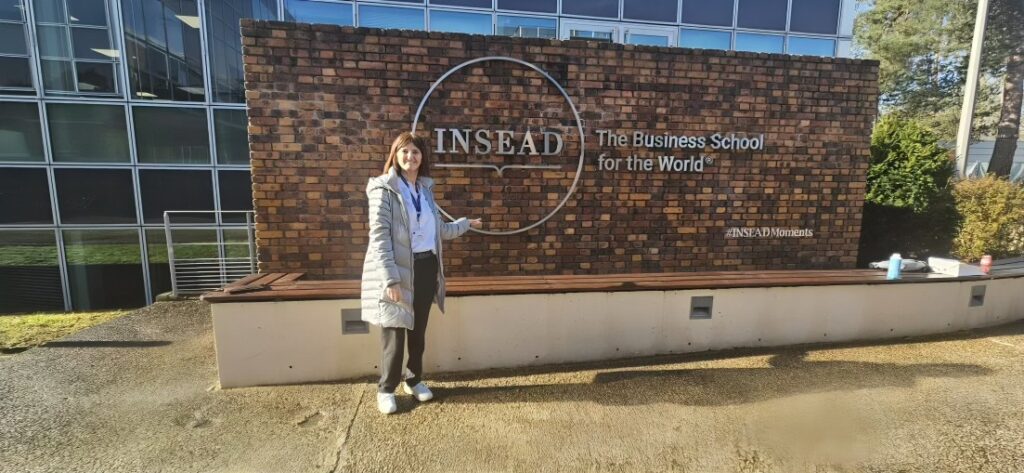
This program has been an incredible gift on my leadership journey. It has given me access to world-class training, new perspectives, and a global network of inspiring women. I completed the INSEAD [a highly-regarded business school in France] segment of the program, which gave me advanced skills in leadership and business strategy. In June, I had the privilege to spend one week at Harvard Business School, where I refined my abilities in creating sustainable change and innovative solutions. Equally important, through IWF I built deep connections and a strong network with other women leaders from around the world—relationships that continue to inspire and support me.
Within the frames of the IWF program, I also carried out my legacy project, creating mentorship opportunities for women with different types of disabilities. This project is especially close to my heart, because I know from personal experience how important it is to have guidance, encouragement, and role models when navigating barriers.
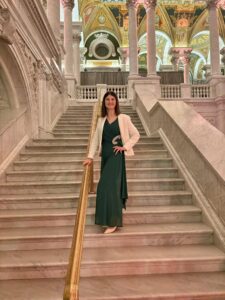
One of the most unforgettable moments of my journey was participating in the IWF 50th anniversary celebration at the Library of Congress in Washington, D.C. Standing in such a historic place, surrounded by powerful women leaders from across the globe, I felt both humbled and proud. Humbled, because I was reminded of how far women’s leadership has come and how much work still lies ahead. Proud, because as a woman with a disability from Armenia, I was part of this global community, recognized for my contributions.
Alongside my personal growth, my organization Agate continues to lead important initiatives that empower women and girls with disabilities, support their independence, and promote their rights. Through our current programs, we are working to prevent violence, advance sexual and reproductive health and rights, and expand access to education, employment, and inclusive services. We are also actively engaged in an international program with Georgia and Moldova, strengthening regional cooperation on disability rights. In Armenia, we are carrying out a two-year technical assistance program with the European Network on Independent Living (ENIL) to support Disabled People’s Organizations (DPOs), building their capacity to advocate more effectively for equal rights and participation. Together, these efforts reflect our belief that women with disabilities deserve equal opportunities to live with dignity and to shape the future of their communities.
While I continue to grow personally, I always see it as my responsibility to open doors for others. I use every platform I have to push for inclusion and to make sure that leadership programs like the IWF Fellows are accessible to women with disabilities. For me, true leadership means lifting others as we climb.
To all women with disabilities who dream of making a difference, I encourage you to apply for the next IWF Leadership Fellows Program. It has been a life-changing experience for me, and it can be for you too.
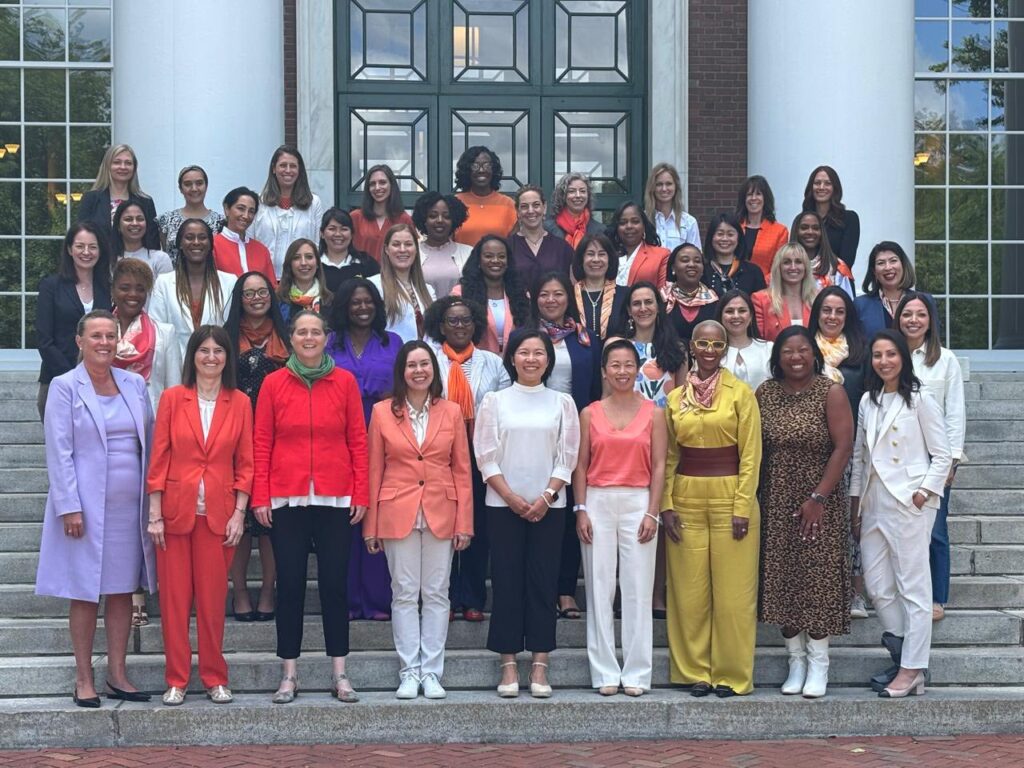
MIUSA’s Q&A with Karine
MIUSA: Briefly, give us an overview of how your fellowship was structured.
Karine: The IWF Fellowship program starts with an orientation week in Washington, DC. From September to May, we participated in a series of virtual sessions, combined with about 20 hours of preparation work, including reading case studies and leadership materials. All of this was designed to prepare us for the two in-person, one-week programs at INSEAD [Business School] in France and at Harvard Business School in Boston.
MIUSA: Tell us more about your time in France at INSEAD Business School and how it shaped your views about leadership.
Karine: It was a one-week program at INSEAD Business School for the World, located in Fontainebleau, just outside of Paris. INSEAD is one of the top global institutions for executive education, and the program was very intensive. We had lectures, case studies, and workshops with outstanding professors, focusing on leadership, strategy, and innovation.
As part of the fellowship, I also had a 360° review of my leadership style, which gave me a comprehensive picture of my strengths and areas for growth. To support this process, I was assigned a coach who worked with me on translating the feedback into practical steps for my leadership journey.
One of the most inspiring sessions during the program was on the Cultural Map, which explored how cultural differences shape communication, leadership, and teamwork across countries. It gave me valuable insights into how to better collaborate with international organizations when our NGO has a joint project, and to adapt my leadership style in diverse contexts. Although the perspective was rooted in the business world, the lessons were highly relevant to my work in the nonprofit and disability rights sectors.
MIUSA: Which aspects of your week at Harvard Business School did you find most valuable?
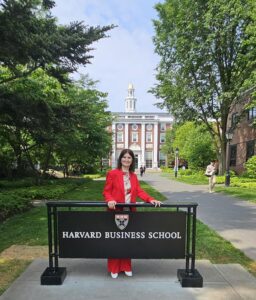
Karine: I participated in a one-week program at the Harvard Business School in Boston, Massachusetts, focused on leadership development in today’s rapidly changing world. Before the program began, each of us prepared a personal challenge statement, outlining a key leadership issue we wanted to address. During the week, we had daily group meetings with our Board of Advisers, where we worked together to analyze these challenges and design concrete action plans to tackle them.
The program itself explored different leadership styles, strategies for navigating turbulent times, and the opportunities and challenges brought by artificial intelligence. The sessions combined case studies, interactive discussions, and personal reflection, which made the learning highly practical and immediately applicable. What I found most valuable was understanding how leaders can remain adaptable, resilient, and values-driven while guiding organizations through uncertainty.
Alongside the academic components, we also created space for social gatherings and informal activities, from cultural and personal exchanges to evenings of music and dance. These moments of connection added joy to the experience and strengthened the bonds among fellows.
MIUSA: All IWF Fellows receive mentorship as part of the fellowship. What was this experience like for you?
Karine: My mentor was Phumzile Mlambo-Ngcuka, a truly inspiring leader from South Africa who has held many important roles, including serving as Deputy President of South Africa and as Executive Director of UN Women. I had the privilege of connecting with her four times during the fellowship, and although the conversations were few, they were honest, meaningful, and truly life-changing.
What I valued most was her guidance on balancing my personal and professional life—something that is always a challenge for me as both a leader and a mother. She helped me see how important it is to protect time for family while still pursuing ambitious goals in advocacy and leadership. We also spoke about growing as a leader, thinking more strategically about impact, and remaining resilient in the face of challenges. Having a mentor of her stature listen so deeply and respond so thoughtfully gave me confidence and clarity that I will carry forward in my work and in my life.
MIUSA: Through the Fellowship, you met other women leaders from around the world! Who were some of the Fellows who most inspired you by the work they do?
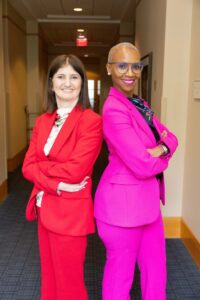
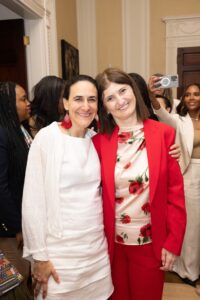
Karine: I was inspired by many fellows, and I made deeper connections with two who especially stood out. Dina Buchbinder Auron and I shared similar experiences—both of us run nonprofits we founded 18 years ago. She is the founder and president of Education for Sharing in Mexico. She moved to the USA for her personal life, while I go back and forth between Armenia and Canada for personal and professional reasons. We both love our work so much that we sometimes forget to take time for ourselves. I made a deeper connection with her, sharing experiences, challenges, and strategies as nonprofit leaders.
Karen Matsiko Taylor also inspired me deeply. She is the Sub-Saharan Africa Head of Trade Finance at DP World, and she shares similar values about family and community, having moved from New York to Africa so her children could grow up understanding these principles. I also connected closely with her, learning from her leadership approach and commitment to mentorship and impact.
In addition, we shared our experiences of balancing leadership roles with motherhood, which made our conversations even more meaningful and relatable.
MIUSA: With the fellowship’s emphasis on business, were there any lessons from the business world that most resonated with you, as someone who works in the non-profit sector?
Karine: Even though my work is in the nonprofit and disability rights sector, one of the most important lessons from the fellowship was understanding how shared values among staff members and the overall organizational culture—whether in business or nonprofit—directly affect performance, motivation, and impact.
I also learned about adaptive leadership and decision-making in uncertain or turbulent times, which is very relevant for nonprofit work where challenges and resources can change quickly. Another lesson that resonated deeply was the value of innovation and data-driven approaches. From workshops at INSEAD and Harvard, I learned how businesses analyze challenges, anticipate risks, and measure outcomes, and I realized how these principles can strengthen advocacy and program design in civil society. Finally, learning from global peers and hearing real-life business examples helped me see my own work in a broader context and inspired me to think creatively about scaling initiatives.
MIUSA: As part of your IWF legacy project, you created mentorship opportunities for women with different types of disabilities! Who will participate in these opportunities, and what is your vision for the project going forward?
Karine: The mentorship project is very close to my heart. The participants will primarily be young women with diverse disabilities in Armenia, including those from rural areas and women displaced from Nagorno-Karabakh. My vision is to connect them with accomplished women leaders—experienced professionals both with and without disabilities in Armenia—who can serve as mentors.
At a later stage, I also plan to involve IWF alumnae from my cohort, particularly for women with disabilities who know English. These mentors will provide guidance, encouragement, and real-life examples of success. In this way, the project will build bridges between women with disabilities and role models who can support their personal and professional growth. Over time, I hope to expand the mentorship network internationally, so that women with disabilities in other countries can also benefit.
MIUSA: Now that the fellowship has concluded, will you have access to any unique benefits as an alum?
Karine: One of the most valuable benefits of the fellowship is the structured three-year pathway for alumni. During this time, we can participate in IWF events and conferences, connect with members of IWF forums around the world, and gradually build deeper engagement in the network. Alumni also have the opportunity to apply to become full members of IWF, which allows for even more meaningful participation.
For me, one of the most exciting aspects is the chance to build relationships with women who have diverse experiences in areas such as finance, fundraising, strategic planning, and communications. I am planning to involve some of these experienced leaders in the advisory board of my organization, which will strengthen our governance and expand our impact. This pathway ensures that the fellowship is not just a one-year experience but the start of a longer journey of learning, networking, and collaboration.
MIUSA: What do you think will be the lasting impact of the fellowship on your professional career and life as a leader?
Karine: Beyond the practical benefits, the lasting impact of the IWF Fellowship on my professional career and life as a leader has been profound. The program helped me realize that to lead better, I need to live better. I have started to value how I spend my time, especially with my family, and I have learned to delegate more tasks to my staff, which not only improves our organizational efficiency but also gives me more space to focus on my personal life and happiness.
The fellowship also broadened my perspective on leadership beyond Armenia. I am now thinking about expanding my work internationally and engaging with global human rights mechanisms to have a wider impact.
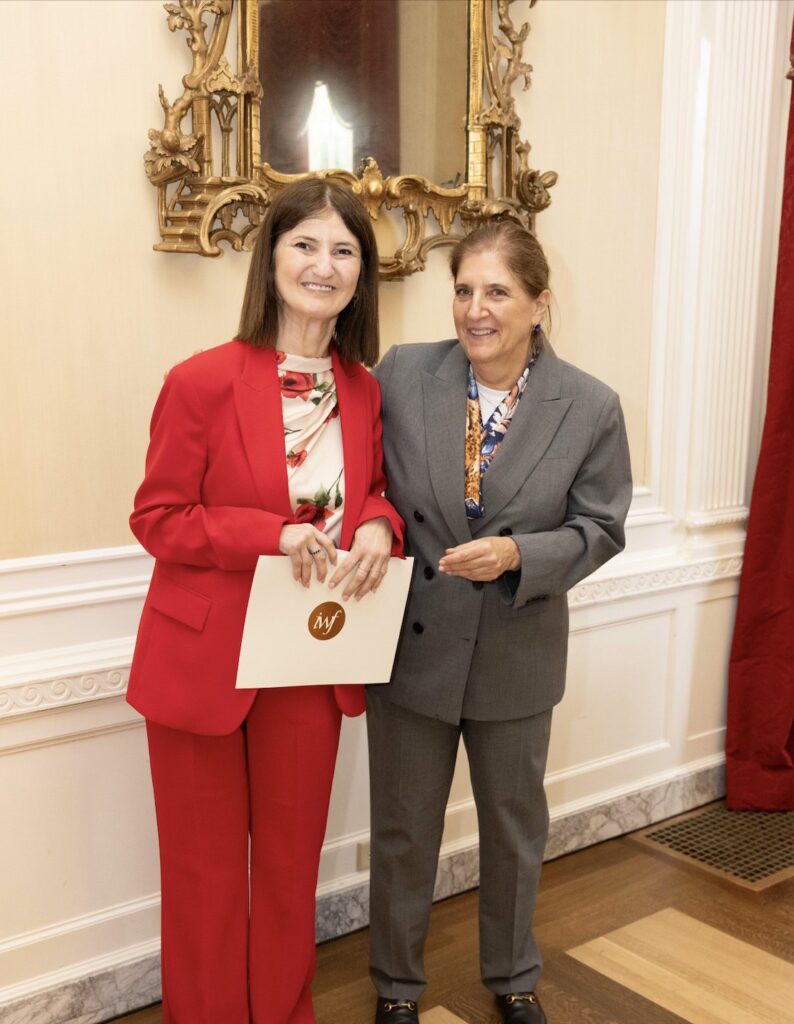
MIUSA: What information would be helpful for other disabled women applicants to know about the fellowship?
Karine: For other women with disabilities considering the IWF Fellowship, I would say that it is an incredible opportunity to grow as a leader, expand your network, and gain a global perspective. The program is suitable for women who are already leading initiatives, have a strong vision, and are ready to take their work to the next level. This fellowship is especially valuable for women who are ready to lead change, connect with global peers, and influence both local and international initiatives.
The application process had two stages. The first was an online submission that included essays and recommendation letters. The second consisted of two separate interviews. Throughout the process, I informed the IWF team that my disability affects my mobility and speech, and later shared my accessibility needs for in-person meetings and travel to program venues. Both the staff and my cohort members were very supportive.
This experience reinforced for me that women with disabilities often need to be their own advocates, while also helping others gradually understand and address accessibility needs. To the best of my knowledge, I was the only woman with a disability in my cohort, which gave me a unique opportunity to share perspectives on both the challenges and the strengths of women with disabilities.
I believe my presence helped broaden the understanding of other fellows and IWF staff about disability inclusion, accessibility, and the importance of inclusive leadership. I also encourage applicants to prepare thoughtfully for the interviews and to highlight not only their achievements but also the impact they want to create.
About the IWF Leadership Fellows Program
IWF’s world-class Leadership Fellows Program accelerates the path to high-level executive leadership for women across all sectors. It is custom built for leaders 3-5 years away from the most senior roles in their professions.
Fellowship Components
- Curriculum: Customized instruction that includes a 3-day leadership immersion to set the stage for the year; a 4-day program at INSEAD in France; a 5-day experience at University of Cambridge in England; virtual masterclasses with IWF thought leaders; and a legacy project that benefits Fellows’ organizations and communities.
- Mentoring: Program participants are carefully matched with IWF members who share their experience and expertise to help Fellows achieve individual professional development goals.
- Networking: Fellows engage with IWF’s global membership at conferences that feature cutting-edge content, expert speakers, and small group dinners for exclusive, one-of-a-kind networking and bonding.
- Community: Fellows become part of an enduring cohort of high achieving peers and alumnae who support and enrich one another’s professional and personal lives well beyond the Fellowship.
Tuition and Scholarships
Program tuition is US $35,000, which includes:
- Immersive 3-day orientation and training
- IWF World Leadership Conference and Gala
- Customized training at INSEAD in Fontainebleau, France
- University of Cambridge in Cambridge, England
- Mentoring focused on individual needs
- Meals and accommodations
- All course materials
Transportation (ground and/or air travel) is not included.
Scholarships
IWF offers a limited number of highly competitive scholarships for the Leadership Fellows Program. The Global Selection Committee makes scholarship decisions in parallel with overall Fellows Program selection. Successful scholarship applicants will be notified upon acceptance to the Fellows Program. Some Fellows also seek sponsorships for their program tuition from their networks and trusted organizations.
Learn more about the program, including candidate criteria and timelines, here.
About the International Women’s Forum (IWF)
The International Women’s Forum is a network providing professional and personal support to women in executive-level leadership positions across careers, cultures and continents. Today it connects more than 8,400 preeminent women leaders in 77 Forums in 35 countries around the world.
